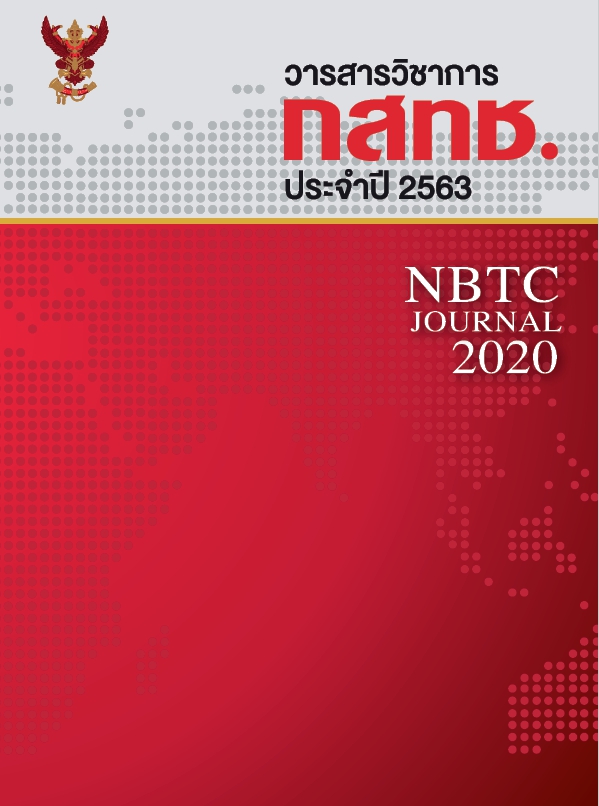Public Policy and the Rule of Law: Perspectives from ‘Must Carry’and ‘Must Have’ Rule
Keywords:
Public Policy,, Television,, Rule of LawAbstract
The Rule of Law is fundamental principle of law, developed in the western world. Its objective is to constrain the rulers’ power so that no one including the most highly official is above the law. In Thailand, the Rule of Law has been established in the 2007 Constitution stating that government agencies must adhere the Rule of Law in their operations such as the creation of laws and regulations. The National Broadcasting and Telecommunications Commission (NBTC), as a national regulator, has adopted the Rule of Law principle as a guideline for formulating rules and regulations. The article selects Thailand ‘Must Carry’ and ‘Must Have’ Rule as cases for presenting the Rule of Law of NBTC.
References
คณะอนุกรรมการวิชาการว่าด้วยหลักนิติธรรมแห่งชาติ และคณะอนุกรรมการบรรณาธิการหนังสือหลักนิติธรรมในคณะกรรมการอิสระว่าด้วยการส่งเสริมหลักนิติธรรมแห่งชาติ. (2557). หลักนิติธรรม The Rule of Law ความหมาย สาระสำคัญ และผลของการฝ่าฝืนหลักนิติธรรม. ค้นเมื่อ 30 มีนาคม 2562, จาก http://www.nrlcthailand.org/nrlc2013/ download/20141126.pdf.
นที ศุกลรัตน์ และณัฐชญา ทวีวิทย์ชาครียะ. (2559). แนวทางการขับเคลื่อนแนวนโยบายสาธารณะในกิจการโทรทัศน์ภายใต้กรอบกฎหมาย: กรณีกิจการโทรทัศน์และรายการโทรทัศน์สำคัญที่ให้บริการเป็นการทั่วไป. วารสาร กสทช. ประจำปี 2559. 2016(1), 15-45.
ปกป้อง จันวิทย์. (2554). การวิเคราะห์กฎหมายด้วยหลักเศรษฐศาสตร์: แนวคิดและวรรณกรรมปริทัศน์. กรุงเทพฯ: สถาบันวิจัยเพื่อการพัฒนาประเทศไทย.
ประกาศคณะกรรมการกิจการกระจายเสียง กิจการโทรทัศน์ และกิจการโทรคมนาคมแห่งชาติ เรื่อง หลักเกณฑ์การเผยแพร่กิจการโทรทัศน์ที่ให้บริการเป็นการทั่วไป. (24 กรกฎาคม 2555). ราชกิจจานุเบกษา. เล่ม 129 ตอนพิเศษ 118 ง.
ประกาศคณะกรรมการกิจการกระจายเสียง กิจการโทรทัศน์ และกิจการโทรคมนาคมแห่งชาติ เรื่อง หลักเกณฑ์รายการโทรทัศน์สำคัญที่ให้เผยแพร่ได้เฉพาะในบริการโทรทัศน์ที่เป็นการทั่วไป พ.ศ. 2555. (4 มกราคม 2556). ราชกิจจานุเบกษา. เล่ม 130 ตอนพิเศษ 1 ง.
พระราชบัญญัติองค์กรจัดสรรคลื่นความถี่และกำกับการประกอบกิจการวิทยุกระจายเสียง วิทยุโทรทัศน์ และกิจการโทรคมนาคม พ.ศ. 2553. (17 ธันวาคม 2553). ราชกิจจานุเบกษา. เล่มที่ 127 ตอนที่ 78 ก.
พระราชบัญญัติการประกอบกิจการกระจายเสียงและกิจการโทรทัศน์ พ.ศ. 2551. (26 กุมภาพันธ์ 2551 ). ราชกิจจานุเบกษา. เล่มที่ 125 ตอนที่ 42 ก.
รัฐธรรมนูญแห่งราชอาณาจักรไทย พุทธศักราช 2550. (24 สิงหาคม 2550). ราชกิจจานุเบกษา. เล่มที่ 124 ตอนที่ 47 ก.
วรพจน์ วิศรุตพิชญ์. (2538). หลักการพื้นฐานของกฎหมายปกครอง. กรุงเทพฯ: มหาวิทยาลัยธรรมศาสตร์.
วรเจตน์ ภาคีรัตน์. (2549). ความรู้เบื้องต้นเกี่ยวกับกฎหมายปกครอง หลักการพื้นฐานในกฎหมายปกครอง และการกระทำทางปกครอง. กรุงเทพฯ: สำนักพิมพ์วิญญูชน
อรรถพล ใหญ่สว่าง. (2557). หลักนิติธรรม. ค้นเมื่อ 30 มีนาคม 2562, จาก https://www.senate.go.th/assets/portals/93/fileups/272/files/S%E0%B9%88ub_Jun/3journal/b166%20jun_11_1.pdf
อรรถพล ใหญ่สว่าง. (2558). หลักนิติธรรมภายใต้การปกครองระบอบประชาธิปไตย. ค้นเมื่อ 30 มีนาคม, 2562, จาก http://www.matichon.co.th/news_detail.php?newsid=1424682345
Downloads
Published
How to Cite
Issue
Section
License
The Office of the NBTC holds the copyright of articles appearing in the journal. The Office of the NBTC allows the public or individuals to distribute, copy, or republish the work under a Creative Commons license (CC), with attribution (BY), No Derivatives (ND) and NonCommercial (NC); unless written permission is received from the Office of the NBTC.
Text, tables, and figures that appear in articles accepted for publication in this journal are personal opinion and responsibility of the author, and not binding on the NBTC and the Office of the NBTC. In case of errors, each author is solely responsible for their own article, and not concerning the NBTC and the NBTC Office in any way.



